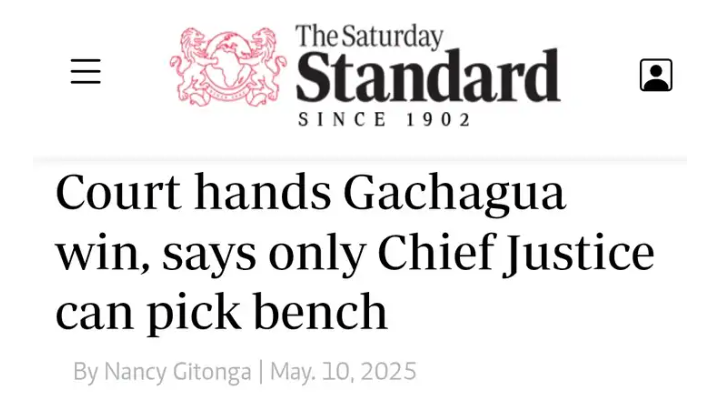Former Deputy President Rigathi Gachagua has scored an important legal victory after the Court of Appeal ruled that the bench set up to hear his impeachment case was formed illegally. The court declared that the three-judge bench assigned to handle the matter had been wrongly appointed by Deputy Chief Justice Philomena Mwilu.
According to the ruling delivered by the Court of Appeal President Justice Daniel Musinga, and Justices Mumbi Ngugi and Fred Ochieng, the decision to appoint the judges was not within Mwilu’s powers under the Constitution.
The case revolved around an earlier decision by the Deputy Chief Justice to pick Justices Anthony Mrima, Frida Mugambi, and Eric Ogolla to handle Gachagua’s impeachment case. The Court of Appeal has now found that this appointment violated legal procedures. The judges made it clear that only the Chief Justice has the power to select multiple judges to sit on such a bench, and this authority cannot be taken over by the Deputy Chief Justice unless certain conditions are met.
Those conditions, the court said, include clear delegation of power or exceptional situations, neither of which was present in this case.The ruling noted that there was no sign that DCJ Mwilu had been acting as Chief Justice at the time she appointed the judges.
There was also no official communication to suggest that she had been given the authority to do so. The court emphasized that the appointment of a multi-judge bench is a sensitive matter and must follow the Constitution to avoid undermining the integrity of the judiciary. It added that any unusual actions around such appointments must be clearly explained and communicated to all the involved parties, which did not happen in this instance.

As a result of this, the court nullified the entire bench and ordered Chief Justice Martha Koome to appoint a new one within fourteen days. This disbanding of the three-judge panel is a major development in Gachagua’s legal battle.
The court also rejected arguments made by the other parties who claimed that the case could not go on without having the Chief Justice or Deputy Chief Justice as official respondents. This shows the court was focused purely on the issue of procedure and not personal positions.
Gachagua had taken the matter to the High Court soon after Mwilu’s appointment of the bench in October 2024, but the High Court at the time had ruled in favor of the DCJ. He then appealed that decision, which has now resulted in this outcome in his favor. The ruling is not just a personal win for Gachagua but also a reminder of the need for strict adherence to legal processes, especially in high-level constitutional matters.
